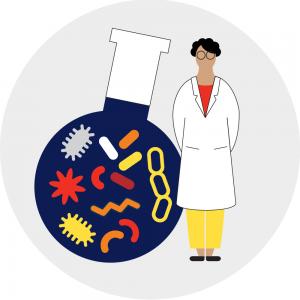Don’t have an account?
Select the donation type you’d like to make
Take a closer look
Your digestive system
When it's a problem
What we can do

What it involves
“I've got a lot to look forward to in retirement. At least I'm healthy enough to enjoy it.”
Hear from Kevin, a recipient of Lifeblood FMT through a clinical trial.
Learn more
Lifeblood collects and processes donations of microbiota from our generous, non-remunerated donors in Perth and manufactures it into FMT.
We then provide clinicians with our product to help treat patients suffering from debilitating infections of the gut, and for other conditions through clinical trials.
FMT is particularly effective in treating Clostridioides difficile infection, commonly known as CDI. It's a serious bacterial infection within the gut, and occurs in some patients who’ve had treatment with antibiotics. It's pervasive, debilitating, and can sometimes be fatal.
Research shows that FMT treatment for CDI has around a 90% cure rate.
We're glad you asked! Lifeblood is currently involved in various approved clinical trials, investigating FMT for the treatment of: CDI, Graft versus Host Disease, Inhibitor Checkpoint Colitis and the restoration of gut microbiota in patients with Persistent Critical Illness.
Your donation guide
To be a donor, you must live in the Perth, Western Australia metropolitan area and be available to donate regularly at our Microbiota Donor Centre in the CBD. Donation cycles typically run for 4-6 weeks at a time, so your time commitment is essential.
Just like our other donors, microbiota donors need to be screened to make sure that their donation is safe for the person receiving it. So, you’ll need to meet health and testing requirements too.
The screening requirements for donors are extremely thorough for patient safety, which means a lot of people don’t make it to donating, even if they’re generally healthy. So, if you do, you're pretty special: one of the handful of unique, life-giving microbiota donors in Australia.
Start by taking our quick quiz to check your eligibility, and registering your details.
Once that’s done, you'll get a call from a friendly and discreet staff member with some confirmation questions. They'll book you in for an appointment for the next stage of screening. You’re able to schedule in a time beforehand that aligns with your body's own schedule and ensures your privacy.
At every stage of the process, any personal and confidential information we gather from you is covered by privacy laws and our Lifeblood privacy policies, where you can download the privacy policy and consent form to review beforehand.
Donating takes place at a private, single-purpose area at our Microbiota Donor Centre in the Perth CBD.
It's not like a public toilet; this is a well-ventilated, soundproof and hygenic room for your comfort.
After a quick interview to make sure you’re OK to donate, you'll be given a donation kit and plenty of time to relax in a private sitting area to let nature take its course. Once you’re finished, one of our coordinators will collect the donation kit and you'll be on your way, knowing you've done something good for the day.
I want to be a donor
Great! To be a donor, you must be in the Perth metro area and meet health, availability and testing requirements.
Check your eligibilityI’m a health professional, or researcher
Find out more about ordering our product for patients or research.
Order nowHow do I access the treatment as a patient?
We recommend people interested in FMT as a treatment option speak with their GP or treating clinician. They can contact us on 1300 441 227 for more information.


